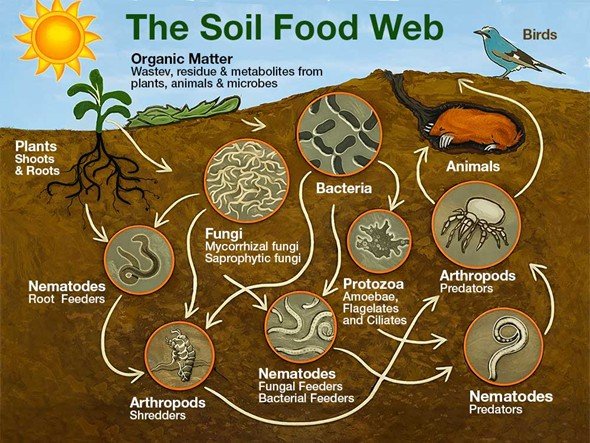All Live Blog Posts
By combining native plants, ornamentals and flowers with a food garden, you can create a beautiful and productive outdoor space that will provide fresh produce, attract wildlife, and bring joy to your life. It is a wonderful way to bring beauty, sustainability, and fresh produce to your outdoor space. Create a unique & thriving edible landscape with natives, flowers, ornamentals & food crops.
The Soil Food Web shows how soil life turns organic matter into plant nutrition. This is a natural and essential process that releases nutrients, builds soil structure, and supports healthier plants. Your garden soil is a kitchen, recycling center and immune system all in one.
Transformational Gardening is an innovative method used by Deep Roots Project to grow food in organic kitchen gardens with limited space and raised beds. We provide our gardeners with the best products for success – like cedar raised beds, microbe-rich compost and microbe-rich worm castings. Check our many tips and details in our blog posts from the links scattered throughout this post.
Welcome to the Deep Roots Project's full season guide for climate zones 5b and 6a. We go step-by-step through our innovative and easy to learn organic gardening method from early spring preparation through fall harvest.
At Deep Roots, every raised garden bed we build is made from Eastern cedar (often called Eastern Red Cedar). We chose it because it performs beautifully outdoors and it can be a responsible wood choice when it’s harvested and used thoughtfully.
The idea is simple: move healthy peppers into pots before hard frost, keep them alive with minimal effort through winter, and set them back outside in spring for a head start.
In zones 5b and 6a (including the Chicago area), our first frost is usually mid-October. Plant seeds and seedlings in July and August. Some fast growing, fast maturing, cold-hardy vegetables seedlings can be planted as late as early September—the ones that thrive in cooler days and can even sweeten after a light frost.
Using fish emulsion in a food garden is an excellent way to support the health of soil microorganisms and crops. It provides essential nutrients, beneficial microorganisms, and a balanced pH, all while being a natural and sustainable fertilizer option. By incorporating fish emulsion into your gardening routine, you can help to create a healthy and thriving ecosystem in your garden.
Did you know that many ingredients still found in U.S. grocery stores are banned in other countries due to health risks? Look at this list of dangerous ingredients and additives!
Here are 8 delicious vegan recipes for soups, stews, and dips that make excellent use of an abundant lettuce and spinach harvest, and also freeze well.
If you’re looking for a leafy green that thrives when the summer sun is blazing and most other greens have called it quits, Red Malabar Spinach is your new garden best friend. Free seeds are available from us in May and June 2025. Contact the Deep Roots support team at 708-655-6299 or support[at]deep-roots-project.org.
Raised bed soil should touch the native soil below. If you're installing a raised bed on gravel, place the gravel around the bed, not directly under the bed. Also, using landscape fabric under raised beds creates more risks and hassles than benefits.
Tomatoes are the crown jewel of backyard gardens. No vegetable gets planted with more anticipation or more heartbreak when things go wrong. If you’ve struggled to get a good tomato harvest—or you’re growing them for the first time—this guide is here to help you avoid five common mistakes and grow juicy, healthy tomatoes the Deep Roots way.
Starting seeds indoors is a fun and rewarding activity for gardeners of all levels. With a little bit of planning and care, you can grow healthy, strong seedlings that will thrive in your garden. It’s a great way to get a jumpstart on your garden and extend your growing season. It's also a fun and rewarding activity for gardeners of all levels.
This is one of those plants that earns its keep in more ways than one—ornamental beauty in the garden all season long, then natural, homemade mulch to feed next year’s crops. Pretty clever, right?
At Deep Roots Project (DRP), we emphasize the power of high-quality compost and mulch in creating thriving food gardens and sustainable landscapes. But not all compost and mulch are created equal. In this post, we'll guide you through the best uses of DRP's microbe- and nutrient-rich compost and our dense leaf mulch, what to avoid, and how to find safe substitutes if you're gardening beyond our delivery zones.
In today’s gardening world, “compost” is often used as a catch-all term for anything dark, crumbly, and sold in a bag. But don’t be fooled. Compost quality varies wildly—and using the wrong kind can quietly undermine your garden’s health and productivity.
If you're new to gardening with raised beds, adding hoops is one of the smartest, most affordable upgrades you can make. Hoops let you cover your plants with protective materials like shade cloth, bird netting, row covers, or plastic—helping you grow more successfully through all seasons.
grow more successfully through all seasons.
Welcome to your ultimate Spring gardening guide! In this step-by-step roadmap, you'll discover all the essential tasks needed to kickstart your garden for the season. Along the way, you’ll find links to additional blog posts that invite you to explore each topic in greater depth, ensuring you have all the knowledge and inspiration you need to cultivate your green oasis.
And that means one thing – it’s time to DIG IN! Whether you’re a gardening guru or a total newbie, Deep Roots Project is here to make this year your most abundant, stress-free, and delicious growing season yet.
Maximizing your harvests in both spring and fall, especially in northern climates with short growing seasons, requires smart planning and efficient use of space.
Black fabric grow bags have become a favorite among gardeners for their lightweight design, excellent drainage, and root-air pruning capabilities. Yet concerns have emerged about potential micro-plastic shedding and chemical leaching from recycled plastic materials. In this post, we’ll explore the safety of these bags…
For decades, we’ve been told that the “perfect” lawn is a status symbol. But the real power move? Transforming your yard into a productive, beautiful, and eco-friendly space that actually benefits you and the environment.
Pruning is an essential gardening practice that keeps your blueberry and raspberry bushes productive, healthy, and easy to manage.
If you love gardening and hate waiting until spring to start growing, winter seed sowing is for you! Here are easy and low-cost steps start hardy seedlings outdoors during winter using recycled milk jugs.
Expanding upon the inspiring foundation of "Eaters Who Care," this blog post delves deeper into the ethos of the Deep Roots Project, illustrating not only the importance of organic kitchen gardening but also the profound impact it has on individuals and communities alike.
Gardening is a rewarding and enjoyable hobby that can provide a sense of fulfillment, relaxation, and fresh produce. It is also a great way to connect with nature and reduce stress. However, for beginners, starting a food garden can be a daunting task, especially if they are not familiar with the essential practices and common mistakes that can hamper the success of their efforts. In this article, we will discuss some of the common mistakes made by beginner food gardeners and how to avoid them.
Deep Roots Project microbe-rich and nutrient-rich compost is the foundation of our transformational gardening method. But, when it comes to ornamentals, some ornamentals do not like our compost. Read this blog post for details.
Cover crops are an effective way to improve soil health, suppress weeds, and provide other benefits to a raised bed food garden.
At Deep Roots Project, our “Transformational Gardening” approach, based on cultivating thriving soil microbial communities, is about more than just growing plants—it’s about creating a thriving ecosystem within the soil itself.





























